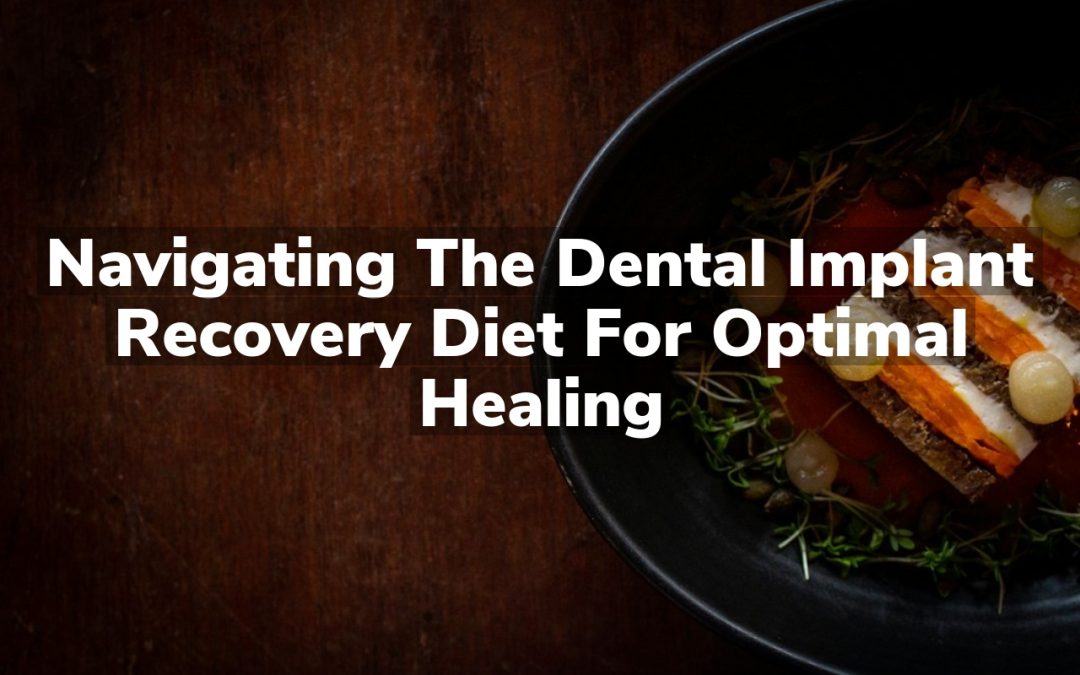Are you wondering how to best support your healing after a dental implant procedure? Conyers Dental Associates is here to guide you through the recovery diet essentials, ensuring your path to optimal healing is both smooth and nourishing.
Immediate Post-Implant Nutrition Guidelines
After undergoing dental implant surgery, it’s crucial to adhere to specific dietary guidelines to ensure optimal healing and avoid complications. In the first 24 to 48 hours post-surgery, your mouth will be at its most sensitive, necessitating a diet that is gentle and non-irritating. During this period, focus on consuming soft foods and cool liquids to minimize discomfort and swelling. Nutrient-rich options like smoothies, broths, and yogurt can provide essential vitamins and proteins for recovery without putting stress on the implant site. It’s also important to stay hydrated with plenty of water, while avoiding hot beverages and using straws, as the suction can disrupt the healing process.
Understanding the intricacies of your dental implant recovery diet is just one aspect of the journey toward a restored smile. For a broader understanding of what to expect after your procedure, consider exploring our resource on the Top 5 Questions Answered About Dental Implant Restoration. This guide will help you navigate the post-operative phase with confidence, addressing common concerns and providing valuable insights into the care and maintenance of your new dental implants. Remember, following these immediate nutritional guidelines is a stepping stone to ensuring a successful recovery and the longevity of your dental restoration.
Foods to Avoid After Surgery
During the recovery period following your dental implant surgery, it’s crucial to avoid certain foods that can hinder the healing process or damage your new implant. Hard, crunchy foods such as nuts, chips, and hard candies should be avoided as they can exert too much pressure on the implant site. Similarly, sticky or chewy foods like caramel or gum can dislodge the implant or irritate the area. Spicy and acidic foods are also not recommended as they can cause discomfort and inflammation in the sensitive tissues. Additionally, extremely hot or cold foods and beverages should be avoided to prevent thermal shock to the healing tissues.
It’s important to follow a soft diet that minimizes the risk of infection and doesn’t disturb the implant site. By steering clear of these potentially harmful foods, you’ll be contributing to a smoother recovery and ensuring the longevity of your dental work. For personalized guidance on post-surgical care and to ensure your dental implant heals properly, consider reaching out to the Dental Implant Experts in Conyers for professional advice and support.
Recommended Soft Food Options
After undergoing dental implant surgery, it’s crucial to adhere to a soft food diet to ensure optimal healing and avoid complications. During the initial recovery phase, your mouth will be sensitive, which is why choosing the right foods is essential. Recommended soft food options include nutrient-rich smoothies, which can be packed with vitamins and proteins for healing. Mashed potatoes, scrambled eggs, and Greek yogurt are excellent for providing the necessary energy without straining your dental work. Applesauce and ripe bananas are gentle on the mouth and can satisfy a sweet craving. For savory preferences, well-cooked pasta and soups with soft vegetables or finely shredded meats offer comfort and sustenance. Remember, selecting foods that require minimal chewing will not only help in managing discomfort but also contribute to a smoother recovery process.
Hydration and Oral Health Maintenance
Ensuring proper hydration is a pivotal aspect of the dental implant recovery diet, as it promotes optimal healing and maintains oral health. Drinking plenty of water not only aids in flushing out toxins but also helps in keeping the mouth clean, which is crucial after implant surgery. Water stimulates saliva production, which naturally combats bacteria and aids in the prevention of infections. Patients should aim to drink at least eight glasses of water daily and avoid beverages that can dehydrate, such as alcohol and caffeine. Additionally, maintaining oral hygiene with gentle rinsing can help prevent complications and support the healing process. It’s important to follow your dentist’s recommendations on oral health maintenance, including the use of any prescribed mouthwashes or saltwater rinses, to ensure a smooth and swift recovery.
Transitioning to Regular Foods Safely
As you progress through your dental implant recovery, reintroducing regular foods into your diet is a crucial step that requires careful planning to ensure optimal healing. To transition safely, start by incorporating soft, easy-to-chew foods that provide ample nutrition without exerting pressure on your new implant. Gradually increase the texture and complexity of your meals as your comfort and confidence grow. Always follow your dentist’s specific guidelines on when and how to return to your normal diet, and be attentive to your body’s response to different foods. By taking these precautions, you can protect your dental investment and pave the way for a swift and successful recovery.
Conclusion
For personalized guidance on your dental implant recovery, call Conyers Dental Associates at 770-483-6655, and don’t forget to read our reviews on Google Maps.

